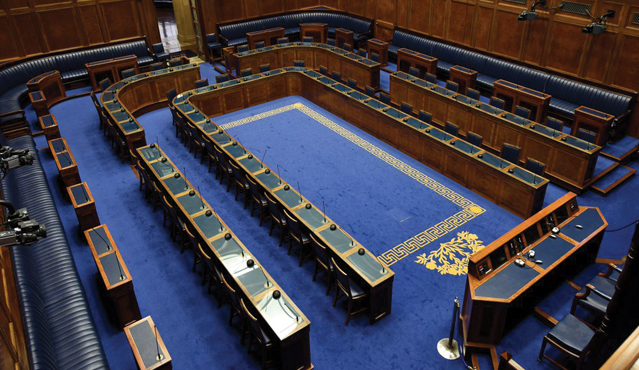Changes to Assembly Opposition standing orders

In October 2020, a New Decade, New Approach commitment was fulfilled when the Standing Order which regulates the Official Opposition was amended to enable a party to join the Opposition up to two years following the formation of an Executive.
Following the May 2016 Assembly election, the Assembly and Executive Reform (Assembly Opposition) Act (Northern Ireland) 2016 provided for the formation of an Assembly Opposition. Agreement on the legislation had been reached during the Stormont House talks in November 2015.
Section 2 of the 2016 Act provides that parties entitled to nominate an individual to ministerial office (or whose members comprise 8 per cent or more of the total cohort of MLAs) may choose to opt out and instead form an ‘official’ Opposition. This Opposition may be formed with one or more qualifying parties.
The Assembly Opposition is tasked with scrutinising the work and performance of the Northern Ireland Executive. Standing Orders provide enhanced speaking rights for the Opposition, or more speaking rights than a member of the Opposition would otherwise be entitled to on the basis of numerical size in the Assembly. This includes the allocation of at least 10 days per annum to Opposition business.
Formation
As per the 2016 Act, an official Opposition may be formed at the time when a ministerial office is to be filled following: the first meeting of the Assembly; all ministers ceasing to hold office; or the application of section 18 (10) of the Northern Ireland Act 1998 where a ministerial office is vacant for any reason (other than if a nominating officer of the party on whose behalf the previous incumbent was nominated does not nominate a person to hold that office).
The New Deal, New Approach agreement committed to amending the 2016 Act to provide for a party to join the Opposition up to two years following the formation of an Executive.
Standing Order 45A makes provision for the timing of the formation of an Assembly Opposition.
Originally, Standing Order 45A paragraph 1 outlined that where a party is entitled to nominate a person to hold Ministerial office and declines to do so, that party may choose to be recognised as part of the official opposition.
This was subject to paragraph 2: “A party is not to be recognised as part of the official opposition if any member of that party holds a Ministerial office, or held a Ministerial office and ceased to hold that office otherwise than at a time when all Northern Ireland Ministers ceased to hold office.”
Paragraph 3 outlined that where only one party choose to be recognised as such, that party will be regarded as the official opposition.
Amendments
However, in October 2020, Standing Order 45A was amended.
Paragraph 1 now reads: “Where, at a time when all Northern Ireland ministers ceased to hold office”, a party is entitled to nominate a person to hold Ministerial office and declines to do so, that party may choose to be recognised as part of the official opposition.
An alternative paragraph 2 was inserted and provides: “Subject to paragraph (3), where, during the relevant period, a party is entitled to nominate a person to hold a Ministerial office under section 18(10) of the Northern Ireland Act 1998, and declines to do so, that party may choose to be recognised as part of the official opposition”.
Paragraph 3 removes the following line from the original paragraph 2 “or held a Ministerial office and ceased to hold that office otherwise than at a time when all Northern Ireland Ministers ceased to hold office”.
Paragraph 4 co-opts the language of the original paragraph 3 and paragraph 5 defines the phrase “relevant period” in paragraph 2 as being a period of two years beginning with the date on which the Ministerial offices are filled under.
Following the Assembly’s restoration in January 2020, the UUP and the SDLP chose to nominate ministers. Currently, therefore, there is no official Opposition. Instead, smaller non-Executive parties undertake an unofficial opposition role.





